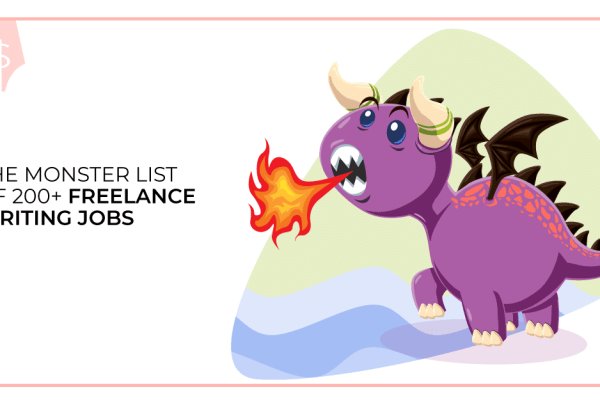Writers specializing in the medical niche have a unique challenge. Because medicine is always changing, there’s a lot to keep up with. New studies, novel treatments, and innovative tools are common.
Another challenge? Most people aren’t prepared to speak the language of doctors and land medical freelance writing jobs. That’s where medical writers really shine. They take complex facts and translate them into clear, helpful content so readers understand what the information is saying and why it matters to them.
If you’ve been thinking about writing in the health field, then keep reading. This guide to becoming a freelance medical writer outlines what medical writers do, the types of medical writing to explore, and where to find real medical blog writing jobs to make money writing.


What does a medical writer do?
A freelance health and medical writer is tasked with creating accurate, easy-to-understand content based on scientific studies and other healthcare-related topics. Their job is to take complex information such as clinical data, medical research, or health-related studies and turn it into clear writing for different audiences.
These audiences can include healthcare professionals, patients, pharmaceutical companies, or the general public. These writing assignments are typically articles published in medical journals or on medical education websites, case studies created for marketing or promotional resources or training materials intended to help sales reps talk about their products in plain language.
Medical writers find freelance writing jobs in various places. They often work with biotech firms, medical device companies, or healthcare clients to produce a wide range of content. This may include:
- Regulatory documents like clinical trial protocols and summaries
- Medical journal articles and case studies
- Web content for health-related blogs or wellness platforms
- Marketing materials for healthcare products or services
- Patient education brochures, newsletters, and opinion pieces
- White papers, slide decks, and medical training materials
In freelance medical writing jobs, writers often manage their workload, deadlines, and client relationships. They must stay organized and meet strict quality and factual standards, especially when working on regulatory writing or documents for clinical trials.
You also need strong research skills. A medical writer must understand clinical data, explain it clearly, and follow industry guidelines. This includes keeping up with trends in the medical field, understanding regulatory affairs, and using correct formatting for each type of document.
Whether writing for blogs and journals, or directly for clients, freelance medical writers will find the most success from being careful, curious, and creative, submitting high-quality, accurate work on time. In short, freelance medical writers play a key role in presenting science with readers, one clear sentence at a time.
However, before you decide to start writing for a living, determine which type of medical writing suits you best.
Types of medical writers
Freelance medical writing includes many specialties. What you write depends on the type of client, the topic, and your skills.
Larger companies—like medical device companies, pharmaceutical companies, and healthcare organizations—often hire different types of medical writers to handle their growing content needs. Each role has a unique focus, but all involve turning medical information into useful, easy-to-read content.
Here’s a breakdown of some common types of medical writing jobs in the freelance world.
Regulatory Writer
These writers focus on regulatory writing, helping companies get approval for medical devices, drugs, and treatments. They create reports, summaries, and other documents that meet strict rules set by health agencies. This type of writing is essential for regulatory affairs teams at pharmaceutical companies or contract research organizations (CROs).
Scientific Writer
A scientific writer works closely with doctors, researchers, and healthcare professionals. They write journal articles, case studies, and abstracts for medical journals and conferences. Their job is to turn complex research into structured papers for professional readers. Scientific writers often work with medical institutes, universities, or professional associations.
Health Communication Writer
This is a more public-facing role. These writers create blogs, web content, news articles, and patient education materials. Their goal is to make medical and wellness topics easier to understand. Health communication writers often write about hair health, nutrition, or disease prevention for the general public. Clients may include media outlets, hospitals, or public health departments.
Medical Education Writer
This type of freelance writer builds educational tools for doctors and nurses. They help create training slide decks, case studies, and learning modules. These writers often work with medical education companies, schools, or healthcare clients to support professional development in the medical field.
Promotional Medical Writer
These writers focus on marketing. They create ads, product descriptions, and press releases for biotech or pharma brands. Some also help with social media content, white papers, or strategy documents. Their job is to highlight the benefits of treatments, devices, or health services clearly and persuasively.
Grant Writer
A freelance medical writer in this area prepares proposals that help researchers win funding. They work with nonprofits, patient advocacy groups, or academic institutions to write grant applications. A strong understanding of medical research, good writing skills, and the ability to follow instructions play a key part in this type of work.
Each type of freelance opportunity comes with different clients, content styles, and expectations. Some writers stick to one specialty, while others mix blog writing with technical work.
The best way to grow is by building writing samples, staying active on sites and job boards that post blog writing jobs, and watching for job alerts that match your skills and interests.
How to become a medical writer
Freelance medical writing opens the door to flexible, well-paying work—from short articles to long-form research projects. Whether writing for hospitals, publishers, or health brands, the field welcomes anyone with strong writing skills and a passion for healthcare.
If you’re just getting started in freelance writing, take time to research how to become a freelance writer. Once you have the business basics down, then you can move on to specializing in order to land medical blog writing jobs with ideal clients.
Build your educational base
Start with a degree in a science-related field like biology, chemistry, or nursing. A solid background helps when writing about complex health topics. Coursework in English, journalism, or medical communications adds value.
Some clients want writers with a Master’s or PhD in life sciences, especially for technical projects. Online courses or internships can also boost your experience.
To stand out, consider getting certified. The Medical Writer Certified (MWC®) credential from the American Medical Writers Association (AMWA) shows professionalism and skill. Freelance writers with this title often land more trusted jobs in healthcare writing.


If you’re looking for a supportive community of freelancers, then joining Freelance Writers Den is a smart move. This is a careful balance of education and support, designed to help writers to learn, improve, and connect with others in the industry. You’ll find resources on pitching, contracts, and how to build a sustainable writing career.
Review your strengths and gaps
Medical writers come from different paths. If you already have a science degree and specialization, then working on your writing technique and business acumen will pay off. If you studied general writing or media in school, then focusing on learning medical terms and research methods will help you break into this niche.
Think about your current knowledge. What topics do you already understand well? What writing tools or styles feel natural? This kind of self-check helps shape your next steps.
Sharpen writing and language skills
Good writing makes medical content clear and useful. Focus on grammar, structure, and tone. Understand how to write for different readers, whether it’s a patient or a doctor.
Study web writing, where short sentences, subheadings, and bullet points keep things skimmable.
Learn the shorthand in medicine
Get familiar with medical terms. Understanding word roots, prefixes, and suffixes helps decode complicated topics.
Know the difference between acronyms and abbreviations. Learn how to write about conditions or treatments in a way that avoids confusion. These skills make your work more trusted by healthcare clients.
Follow ethical guidelines
Strong ethics matter in medical writing. Writers often deal with real patient data and clinical trials. Keep your work honest and respectful. Learn the basics of ethical medical communication—things like citing sources properly, avoiding bias, and staying transparent.
Choose a focus area
Picking a niche makes it easier to market your skills. Some writers focus on regulatory writing, while others write for medical blogs or patient education sites.
A few paths to consider include:
- Writing clinical trial summaries
- Creating patient leaflets or wellness guides
- Editing journal articles
- Writing grant proposals
- Building medical education content
- Managing a medical blog
Think about who your ideal clients could be. List out the services they need. Check whether you have the tools to offer those services or if you need more training.
Online classes and mentorships can help you build skills in your chosen area. Once you feel confident, you can branch out to new specialties and grow your content reach.
Build a strong portfolio
A writing portfolio shows your ability to handle different topics and writing formats. It’s the first thing a potential client will ask to see.
Start by creating samples in your chosen niche. Write blog posts, patient handouts, or mock research summaries. Set up a simple portfolio website with links to writing samples.
Guest posting on health sites or joining public writing challenges can also help. Over time, your portfolio will speak for itself.
Grow your network
Networking leads to referrals and job leads. Reach out to friends, former coworkers, or other writers and tell them you’re offering freelance medical writing services. Join writing groups, both locally and online. Some of the best places to connect include:
Attend webinars and online events. The more people who know about your work, the more chances you’ll get recommended for new projects.
Start searching for jobs
Lots of websites list freelance medical writing jobs. You’ll find contract roles, short-term projects, and part-time remote options. Search daily on platforms like:
- ZipRecruiter
- Indeed
- Upwork
- Freelancer
You can also send cold emails to healthcare marketing agencies, wellness brands, or medical content platforms. Keep your messages short and clear. Include writing samples and explain how your work helps solve their content needs.
Tailor every application. Make sure your message fits the job listing, and your samples match what they’re hiring for.
Now that the foundation is set, it’s time to explore websites actively hiring freelance medical writers—so you can find medical freelance writing jobs faster and easier.


Medical freelance writing jobs: 10 sites that are paying writers
Looking for paid medical writing jobs or freelance science assignments? These trusted publications offer real opportunities for health writers, clinicians, and science storytellers.
Whether you’ve got personal experience, clinical knowledge, or a strong voice for health topics, these platforms pay for submissions and welcome pitches from new and experienced writers.
1. Healthline
Healthline covers medical news, wellness updates, and expert-reviewed health content. With thousands of articles published, the site frequently offers freelance opportunities for medical writers and editors. Check their careers page for open roles in medical content creation, editing, and remote writing jobs. Writing for Healthline means contributing to one of the top health publications online.
2. Verywell Health
Verywell Health publishes science-based content that supports readers in making informed health choices. Medical writers must deliver high-quality content backed by research. Applicants with a strong background in medical journalism or freelance science writing have better chances. Their team values accuracy, tone, and clear communication. Competitive freelance medical writing jobs often pop up here.
3. CURE
CURE focuses on cancer awareness, patient education, and survivor stories. The magazine looks for remote science writers who can write sensitive content with depth and empathy. Writers may need to interview doctors or survivors and prioritize medical accuracy. Their mission supports patients navigating cancer treatment and recovery, making it ideal for freelance medical writers with oncology experience.
4. HealthyPlace
HealthyPlace offers personal perspectives on mental health challenges. Writers must have lived experience with issues like depression, PTSD, anxiety, or addiction. This site hires contract bloggers to create monthly videos and blog posts. It’s a great fit for freelance health writers passionate about mental health storytelling with a personal touch.
5. Psychology Today
Psychology Today invites licensed professionals, therapists, or experienced health writers to contribute freelance content. Writing samples or published clips must showcase expertise in psychology or mental health. Ideal contributors write engaging, accurate articles on emotional well-being, behavioral science, and therapy. Their guidelines help writers pitch ideas for both print and the web.
6. Patient Care Online
Patient Care Online welcomes clinician-written case reports. They offer a $150 honorarium for accepted submissions. Each report needs to include patient details, clinical history, symptoms, diagnosis process, and chosen treatment. For freelance clinicians or medical professionals seeking writing exposure, this platform offers paid opportunities with educational impact.
7. The Verge
The Verge covers science, tech, culture, and future trends. Science writing gigs here often involve topics like space medicine, biotech, and health innovation. Writers must bring strong reporting skills and a fresh angle. Freelancers who enjoy exploring the science side of medical writing jobs often find exciting projects here.
8. Discover
Discover Magazine publishes stories about science, health, and the environment. Their pay starts at $300 for online pieces and $1 per word for print features. Writers must read their pitch guide and tailor their ideas accordingly. This outlet suits freelance science writers skilled at turning complex topics into readable, engaging content.
9. KevinMD
KevinMD is a widely read platform where healthcare professionals share insights, stories, and opinions on medical practice, policy, and personal experience. They accept guest posts from doctors, nurses, and health writers who can bring authentic perspectives. Payment varies, but many contributors receive compensation for accepted articles.
10. MedPage Today
MedPage Today publishes news for healthcare professionals and patients. Writers cover new research, policy changes, and treatment advances. This platform regularly posts freelance medical writing jobs focused on clinical accuracy. Experienced journalists and writers with a medical background often succeed here, especially those who can meet deadlines and simplify complex ideas.
Tips on landing medical writing jobs
Getting medical blog writing jobs takes more than luck. It takes skill, effort, and a clear plan. Build a strong foundation first—know your niche, polish your samples, and get your portfolio ready. Focus on what you love—maybe it’s medical education, wellness blogs, or regulatory writing.
Stay visible to get paid to write. An optimized LinkedIn bio, a website and solid writing samples will help healthcare clients find you. Don’t wait for job alerts—reach out to pharmaceutical companies, medical device companies, and healthcare professionals. One good connection can lead to steady freelance opportunities.
Keep improving your skills, share your knowledge, and follow up with potential clients. The right match is out there. With focus and creativity, you’ll find it and get paid to write about what matters to you.
Medical Freelance Writing Jobs FAQs
Is medical writing in demand?
Yes, freelance medical writing stays in high demand. More health brands, biotech companies, and digital health startups publish content online. They need skilled writers to create accurate and interesting material. Writers with strong research skills and clear communication bring value to clinical, pharmaceutical, and wellness fields.
Is there a shortage of medical writers?
There’s a growing need for qualified medical writers, especially those with healthcare experience or science backgrounds. As more companies invest in content marketing, regulatory writing, and patient education materials, the freelance medical writing market keeps expanding. Writers who make hard topics easy to understand stand out and can easily land medical freelance writing jobs.
What is the difference between medical coding and medical writing?
Medical coding involves translating healthcare services into billing codes. It’s technical, detail-heavy work used for insurance and hospital records. Medical writing, on the other hand, focuses on content creation—blogs, reports, white papers, or research summaries. Writers who have medical freelance writing jobs explain medical topics in clear, accurate language for different audiences.
How to write a blog about health?
Start by choosing a niche—mental health, nutrition, fitness, or chronic illness. Research trustworthy sources, use simple language, and include real-world examples. Write with your readers in mind. Focus on clarity, tone, and structure. Freelance medical blog writers often create content that educates, builds trust, and improves visibility.
What writing style is used in medical writing?
Medical writing often uses a clear, concise style. For blogs and patient materials, plain language and a friendly tone work best. Technical or regulatory writing needs precision and consistency. Freelance health writers must match tone, follow style guides, and adjust their writing to suit both experts and everyday readers.
Source link





